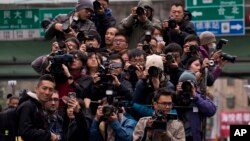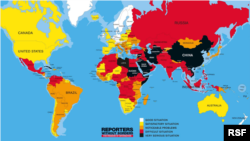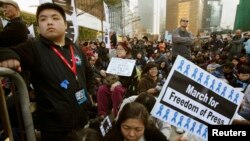An international media watchdog’s choice of Taipei for its first Asia office confirms its ranking of Taiwan as the freest place in the region for journalists despite competition from neighboring countries with long-standing democracies, the group and the island government say.
The French-based media freedom advocacy group Reporters Without Borders (RSF) will open a formal office in Taipei within the next few months -- after rejecting a site in Chinese-controlled Hong Kong -- to monitor East Asia and build connections in local languages with local reporters, said regional director Cedric Alviani.
“On the press freedom index published by RSF every year, Taiwan is the best country in Asia,” he said. “Opening an office in Taiwan is also a way to recognize all the efforts, all the improvements that have been made in the past decades in Taiwan, which is contrasting a lot with the global situation, which is rather decaying.”
Press freedom arrived with democracy
Taiwan’s authoritarian government restricted media content before democratization in the 1980s. Content in the local Taiwanese dialect was banned and the government jailed the translator of Popeye for eight years because it saw the cartoon as a slight against strongman Chiang Kai-shek.
The island of 23 million people, with four mainstream daily newspapers and more than a half dozen cable TV networks, now exercises little control over the content put out by licensed media organizations.
“For such an authoritative group to set up in Taipei, I think one aspect is (RSF’s) recognition for Taiwan’s democracy and Taiwan’s degree of media freedom,” said George Hou, a mass communications lecturer at I-Shou University in Taiwan.
“In addition, on the future path toward democratization, this will of course continue to push us," he said. "Even though we’ve been recognized, there’s no turning back on this path.”
Taiwan welcomes group
Taiwan’s government welcomed the watchdog’s plans as it wants other countries to notice local media freedoms and differentiate the island from political rival China. China has claimed sovereignty over self-ruled Taiwan since the 1940s and uses its economic clout to block the island’s membership in the United Nations and other bodies requiring statehood.
“We very much welcome (RSF’s) decision to set up an Asian headquarters,” Taiwan cabinet spokesman Hsu Kuo-yung said. He calls the promotion of free media part of Taiwan’s “smart power” campaign for stronger recognition overseas in the absence of a U.N. seat.
“For Taiwan’s movement toward democracy and focus on this universal value, it’s especially meaningful to get approval from this organization,” Hsu said.
Group: Taiwan top in Asia
Taiwan ranked No. 51 on the watchdog’s list of 180 spots around the world last year, with Hong Kong in 69th place and mainland China at No. 176. China carefully screens out any media content that may offend the government and owns the country’s major media outlets.
Japanese media, despite operating in one of Asia’s oldest democracies, have faced an evasive government, a crackdown on certain websites and a "long-term censorship policy" following their reports on a nuclear power plant meltdown in 2011, according to fellow media watchdog Committee to Protect Journalists.
Questions about government pressure against media in Japan came up again in March 2016 when three television anchors were fired. They had criticized a restart of nuclear power in Japan and proposals to end the government’s pacifist military policies.
In South Korea, which is also a democracy, former president Park Geun-hye introduced stricter requirements for registering online newspapers and a provision to let third parties request the removal of defamatory Internet content, says the U.S.-based democracy advocacy group Freedom House.
“A lot of countries, they actually are free on paper, but the government authorities, the police put so much surveillance and pressure on media they cannot do their work freely,” Alviani said. “I would say in Taiwan the authorities really respect the rules as they have been set.”
Rejection of Hong Kong
Reporters Without Borders, a 32-year-old group with 12 offices and 130 correspondents, was working last year toward setting up its first Asia office in Hong Kong, a more common go-to place for international organizations seeing regional presence.
The NGO scrapped that plan because it feared the Chinese government might eventually shut it down or endanger the local staff, Alviani said. “In the long run it might be difficult to run our activities from Hong Kong,” he said.
Reporters Without Borders will monitor the media in Taiwan, Hong Kong, mainland China, Japan, both Koreas and Mongolia from the Taipei office.






